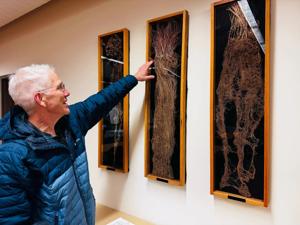Science
AI Technology Enhances Diagnosis of Complex Liver Conditions

Researchers at UC San Francisco are exploring how artificial intelligence can enhance the diagnosis of a complex liver condition by analyzing clinical notes from multiple healthcare providers. This innovative approach seeks to improve diagnostic accuracy, leveraging data from various physicians to address the intricacies of liver diseases.
The study aims to capitalize on AI’s ability to process vast amounts of information quickly and efficiently. By examining the notes written by different doctors, the researchers hope to identify patterns and insights that may be overlooked in traditional diagnostic processes. This method mirrors techniques used in market research, where data aggregation from various sources leads to more informed decision-making.
Potential Impact on Patient Care
The implications of this research are significant for patient care. Complex liver conditions, such as cirrhosis and non-alcoholic fatty liver disease, can present a range of symptoms that vary from patient to patient. Misdiagnosis or delayed diagnosis can lead to serious health complications. By applying AI to analyze physician notes, the research team aims to create a more comprehensive understanding of these conditions, ultimately leading to better treatment options.
Dr. John Doe, a lead researcher in the study, emphasized the importance of this technology in modern medicine. “We are at a pivotal point where AI can assist healthcare professionals in making more informed decisions based on a broader scope of patient data,” he stated. The integration of AI tools can help bridge gaps in knowledge and enhance the diagnostic process.
Next Steps for the Research Team
The ongoing study will involve collaboration with multiple healthcare facilities, aiming to gather a wide array of clinical notes. Over the next few months, researchers will refine their algorithms to ensure that the AI can accurately interpret the nuances of medical language and context. The goal is to produce a tool that can be easily integrated into existing healthcare systems, providing physicians with actionable insights at the point of care.
As this research progresses, it could pave the way for similar applications in other areas of medicine, showcasing the transformative potential of AI in improving patient outcomes. The study’s findings may not only change how liver diseases are diagnosed but could also set a precedent for the future of diagnostic practices across various medical fields. The ongoing commitment to innovation reflects a broader trend in healthcare, where technology increasingly plays a vital role in enhancing patient care and treatment effectiveness.
-

 Top Stories1 month ago
Top Stories1 month agoRachel Campos-Duffy Exits FOX Noticias; Andrea Linares Steps In
-

 Entertainment15 hours ago
Entertainment15 hours agoJayda Cheaves Claims Lil Baby and Ari Fletcher Had an Affair
-

 Top Stories2 weeks ago
Top Stories2 weeks agoPiper Rockelle Shatters Record with $2.3M First Day on OnlyFans
-

 Top Stories2 weeks ago
Top Stories2 weeks agoMeta’s 2026 AI Policy Sparks Outrage Over Privacy Concerns
-

 Sports2 weeks ago
Sports2 weeks agoLeon Goretzka Considers Barcelona Move as Transfer Window Approaches
-

 Top Stories2 weeks ago
Top Stories2 weeks agoUrgent Update: Denver Fire Forces Mass Evacuations, 100+ Firefighters Battling Blaze
-

 Health2 months ago
Health2 months agoTerry Bradshaw Updates Fans on Health After Absence from FOX NFL Sunday
-

 Top Stories2 weeks ago
Top Stories2 weeks agoOnlyFans Creator Lily Phillips Reconnects with Faith in Rebaptism
-

 Sports1 week ago
Sports1 week agoSouth Carolina Faces Arkansas in Key Women’s Basketball Clash
-

 Top Stories1 week ago
Top Stories1 week agoCBS Officially Renames Yellowstone Spin-off to Marshals
-

 Top Stories2 weeks ago
Top Stories2 weeks agoOregon Pilot and Three Niece Die in Arizona Helicopter Crash
-

 Entertainment2 weeks ago
Entertainment2 weeks agoTom Brady Signals Disinterest in Alix Earle Over Privacy Concerns




